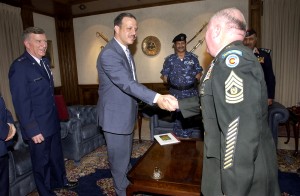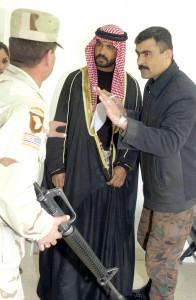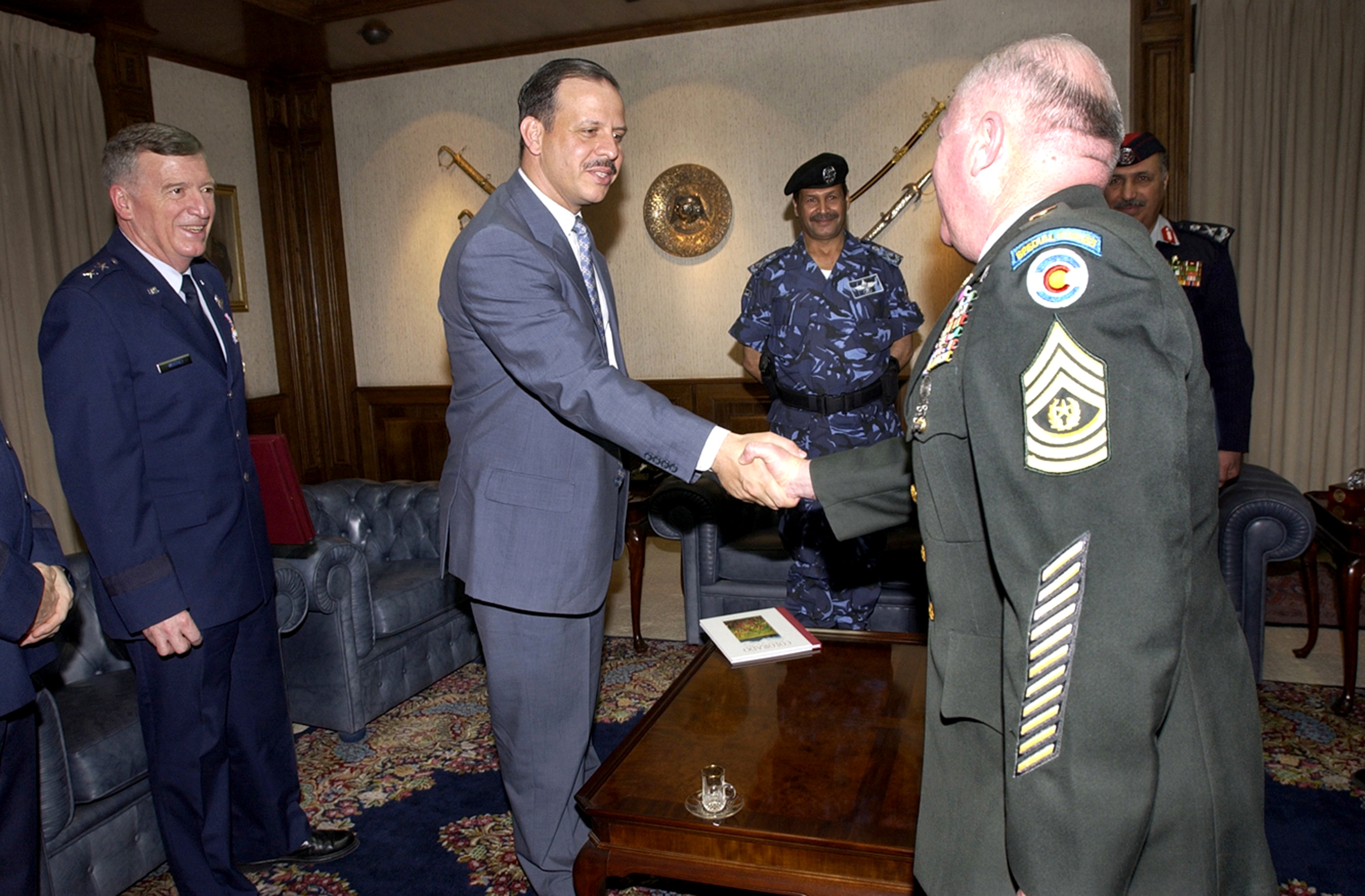By Deb Smith

Prince Faisal (center), commander of the Royal Jordanian Air Force, greets Colorado State Command Sgt. Major Dennis Hopper as Maj. Gen. Mason C. Whitney, Colorado adjutant general (left) looks on.
While many scholars envision peace in the Middle East as a rather distant goal, the Colorado National Guard sees things a little differently—-and perhaps a little closer. In fact, to prove their point, Maj. Gen. Mason C. Whitney, the Colorado adjutant general, and members of his Joint Staff recently traveled more than 4,000 miles in an effort to close that “distance” as part of the state’s exciting new alliance with the Hashemite Kingdom of Jordan.
The unusual connection between Colorado and Jordan came about through the National Guard’s State Partnership for Peace Program-—and at the actual request of the country itself. It’s the first partnership to be forged with a Middle Eastern country in the program’s 12-year history. Previous partnerships focused more on Eastern Bloc and Latin American countries.
Since its inception in 1993, the State Partnership for Peace program has paired more than 48 countries with 42 partner states to foster mutual interests and establish long-term relationships. But more importantly, the program seeks to help its partner countries understand the necessity of civilian control of the military.
The Colorado Guard’s weeklong visit to Jordan comes on the heels of Prince Faisal bin Al-Hussein’s visit to National Guard Headquarters in April 2004, where he offered his country’s official endorsement of the partnership with Colorado. Prince Faisal is the commander of the Royal Jordanian Air Force and the brother of His Majesty King Abdullah bin Al-Hussein, ruler of Jordan.
While in Amman, Whitney and his staff, Brig. Gen. David Sprenkle, assistant adjutant general for the Colorado Air National Guard; Col. Thomas Mills, deputy commander, Colorado Army National Guard; Col. Jay Gates, Colorado international partnership Officer; Command Sgt. Maj. Dennis Hopper, state command sergeant major; and Capt. Andrew Diederich, aide-de camp, toured several training facilities including Jordanian Army Special Forces training school, the language institute, and the Jordanian International Police Training Center now being used to train Iraq’s new police force.
The information collected from the visit will be used to build a yearlong calendar of training and exercise events to support upcoming personnel exchanges between the two partners.
According to Whitney, the National Guard is a very cost-effective role model for developing nations who elect to participate in the Partnership for Peace program.
“The Guard model is a perfect solution for many smaller countries that may not have the resources yet to stand up and maintain a full-time military,” said Whitney, whose state has already had a successful 11-year partnership with Slovenia. “Colorado and Jordan are a perfect fit not only because we are similar in size, population, and terrain, but also because we both fly the F-16.”
Slightly smaller than Indiana, Jordan’s critical placement within the Middle East makes it an ideal location from which to wage peace. Bordering Saudi Arabia, Iraq, Syria and Israel, this country of slightly more than five million people rests in the center of one of the most politically unstable areas in the world. In recent years, Jordan has been a consistent and positive force for peace, serving as a much-needed moderator within the region.
“It’s a tough neighborhood, but a very important one for everyone involved, both now and in the future,” said Gates, “As this partnership grows and matures, we should be able to see its lasting effects in many ways, particularly in areas such as Jordan’s emerging homeland defense program.”
But it’s not just homeland security and antiterrorism tactics that Jordan is interest in strengthening. The country is also looking to the Colorado Guard and the Partnership for Peace program to help them expand their knowledge base in emergency preparedness, disaster response, consequence management, military education and non-commissioned officer development.
“Enhancing the enlisted corps is really a big step in the right direction,” said Hopper, the highest-ranking enlisted soldier in the state. “With well-trained and professional NCOs, I think Jordan will be well on their way to establishing a world-class fighting force they can be proud of.”

Jordan has already taken an active role with coalition forces. Here a U.S. Army soldier works with an Arabic interpreter to gain access to a local man’s home. Both the interpreter and the man are actors brought in to help personnel understand the culture.
Despite limited natural resources and an economy struggling to keep up with increasing population growth, Jordan remains a forward-looking nation that is optimistic for its future. And it should be. Jordan has made tremendous progress in a relatively short amount of time.
With the help of organizations like the U.S. Agency for International Development, Jordan has been able to reform more than 40 of its trade laws, bringing them in alignment with international standards—-and did it in less than eight months. The concentrated effort subsequently enabled Jordan to join the World Trade Organization in 2000 and the European Free Trade Association a year later.
Unlike other wealthier countries in the Middle East, Jordan has no oil reserves, so it must constantly look for new ways in which to boost its economy. Jordan’s King Abdullah has also focused the country on seeking more non-traditional sources of revenue, including technology. With a special emphasis on English language skills and computer sciences now entering the Jordanian school system as early as the first grade, Jordan is carefully positioning itself to become a more recognized force in the world market.
“This is an exciting time for both Jordan and Colorado,” concluded Whitney. “We are looking forward to a long and lasting partnership that will bring us closer together, not only as military professionals, but also as friends.











